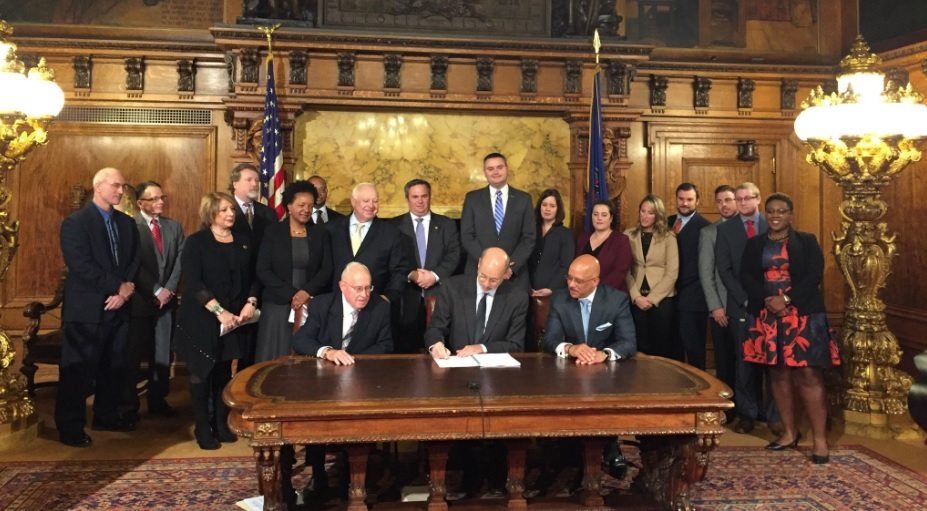The final episode in the long-standing conflict between ridesharing companies and the Commonwealth of Pennsylvania had very little drama.
On Friday morning, Pennsylvania Gov. Tom Wolf signed into effect Senate Bill 984, effectively making rideshare services legal across the state.
Gov. Wolf on Senate Bill 984, legalizing ride-sharing statewide: "This bill is a win for Pennsylvanians." pic.twitter.com/vEaSukCJED
— Governor Josh Shapiro (@GovernorShapiro) November 4, 2016
Both app-based giants in the space, Uber and Lyft, chimed in on Friday, thanking the local authorities for clearing the legislative path for their business across the state.
“The passage of a permanent framework for ridesharing increases modern transportation options and economic opportunity across the state,” Lyft Public Policy Manager Sami Naim said in an emailed statement. “It also ensures Philadelphia’s children and their public schools will benefit from additional funding generated from ridesharing revenue.”
The organization thanked Wolf, the state legislature and Pennsylvania supporters for the approval of the bill.
Uber also sent out an email thanking authorities and riders in the state. “The biggest thank you goes to riders like you,” the company wrote. “Whether you sent an email, called your elected officials or signed our petition, you made a big difference.”
And now that Uber has the stamp of approval, the company announced it was expanding the service to 10 counties across the state.
“Beginning at 5 p.m. today [Friday, Nov. 4], Uber will be available to 100% of Pennsylvanians, providing access to affordable rides and flexible work opportunities for tens of thousands,” spokesperson Craig Ewer told Technical.ly in an emailed statement.
https://twitter.com/Uber_Philly/status/794557126920249348
It was a long fight, as you may have read in our past coverage, which goes all the way back to when East Coast ridesharing pioneer Sidecar was still kickin’.
Here are some of the memorable moments of Philly’s ridesharing wars:
2013: The Philadelphia Parking Authority (PPA), a state agency, made Sidecar illegal (the Silicon Valley startup, whose first East Coast expansion market was Philadelphia, is not to be confused with the Philly ecommerce company also named Sidecar). Sidecar, the ridesharing company, later shut down.
2014: It was announced Uber was operating in Philly, but we found out UberX had actually been running super quietly in the Philly suburbs for months. By the end of the year, a report by the Inquirer suggested there wasn’t enough consensus in the state legistature to update laws and allow companies to operate.
2015: Lyft made a splash in Philly — defiantly so — with the PPA saying it would fine any drivers $1,000 if they caught them. A Daily News investigation revealed that the PPA was actively trying to keep UberX illegal in Philly. Josh Kopelman, early investor in Uber through First Round Capital, had a few words to say.
2016: In July, with the Democratic National Convention rolling into town, Uber and Lyft were allowed to operate for a short period of time by way of a budget agreement, but as the date neared for the end of that deal, the PPA announced it would be sanctioning drivers (not riders) the minute the truce was over. Then all hell broke loose, with a cease and desist order from the Court of Common Pleas forcing companies to shut down and a lightning fast injunction from the Commonwealth Court reversing that order. Which brings us to today, when the last chapter of the story was written.
Rideshare on, Pennsylvania.
Before you go...
Please consider supporting Technical.ly to keep our independent journalism strong. Unlike most business-focused media outlets, we don’t have a paywall. Instead, we count on your personal and organizational support.
Join our growing Slack community
Join 5,000 tech professionals and entrepreneurs in our community Slack today!

The person charged in the UnitedHealthcare CEO shooting had a ton of tech connections

From rejection to innovation: How I built a tool to beat AI hiring algorithms at their own game

Where are the country’s most vibrant tech and startup communities?

